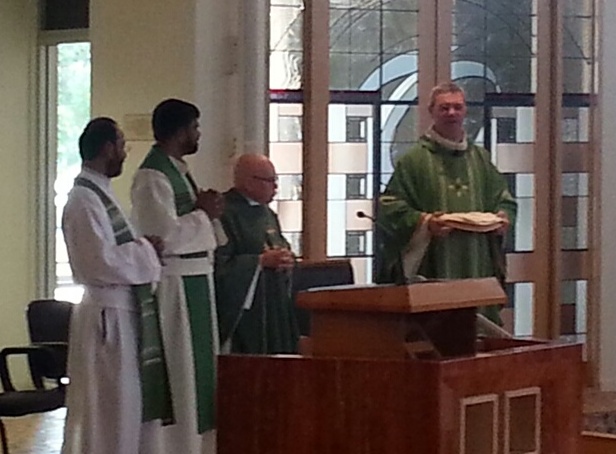Have you ever wondered why?
In the Sacramentary, the big book which contains all the prayers of the Mass (the bits in black), and all the actions during the Mass (the bits in red), it says quite unequivocally ‘the priest kisses the altar’ in both the entrance and the exit parts.
It is definitely a kiss, and not a veneration.
It is definitely a kiss, and not open to interpretation.
Why is this so?
To answer we have to learn from the Bible.
Firstly we need to find out what a throne looks like.
2 Chronicles 9:17-19 which describes how King Solomon constructed his throne:
The king also made a great ivory throne, and plated it with purest gold. The throne had six steps, and a footstool of gold was attached to it. There were armrests on both sides of the seat, with a lion standing beside each armrest. Twelve lions stood on the six steps, one at either end of each step. Nothing like this had ever been made for any kingdom.
The Jerusalem Bible translation most of us are used to, does not translate verse 18 well. But the Hebrew definitely says ‘a footstool of gold’.
Why would a throne have a footstool? We don’t see them in the kingdoms of Western Civilisation, but in the Middle East and in the Orient footstools made it easier for a subject to kiss the feet of the king while the king was sitting on his throne, and in particular easier to kiss the soles of the king’s feet.
Smith’s Bible Dictionary after it talks about kissing between friends, relatives, and in greeting, says this about other uses of kissing:
‘Among the Arabs the women and children kiss the beards of their husbands or fathers. The superior returns the salute by a kiss on the forehead. In Egypt, an inferior kisses the hand of a superior, generally on the back, but sometimes, as a special favor, on the palm also. To testify abject submission, and in asking favors, the feet are often kissed instead of the hand. The written decrees of a sovereign are kissed in token of respect; even the ground is sometimes kissed by Orientals in the fullness of their submission.’
Psalm 71(72):9
May the wild beasts of the desert bow before him,
and his enemies lick the dust.
Isaiah 49:23
Kings will be your foster fathers, their queens your nursing mothers.
They will fall prostrate before you, faces to the ground,
and lick the dust at your feet.
What does God say about His throne?
Isaiah 66:1
Thus says the Lord God: With heaven My throne and earth My footstool, what house could you build Me, what place could you make for My rest?
That is true in general.
But with the building of the Temple and the dedication prayers of King Solomon something more particular emerges.
2 Chronicles 6:18-20
Yet will God really live with men on the earth? Why, the heavens and their heavens cannot contain You! How much less this house that I have built! Listen to the prayer and entreaty of Your servant, Lord my God; listen to the cry and to the prayer Your servant makes to You. Day and night let Your eyes watch over this house, over this place in which You have promised to make a home for Your name. Listen to the prayer that Your servant will offer in this place.
2 Chronicles 6:41-42
Rise Lord God, come to Your resting place,
You and the ark of Your power.
Your priests, Lord God, are vested in salvation,
Your faithful rejoice in prosperity.
Lord God, do not turn away from the face of Your anointed;
remember Your favours to David Your servant.
The Temple in Jerusalem begins to be seen as the place of God’s particular footstool, the place where the tribes go up to worship at the courts of the Lord, and to seek His favour and mercy – which doesn’t negate that the whole of the earth is God’s footstool, it is the place out of all the places on earth where earth is closest to heaven.
Psalm 131(132):7
Let us go to where He is waiting,
and worship at His footstool.
Psalm 98(99):5
Let us extol the Lord our God,
and worship at His footstool, ‘Holy is He!’
Lamentations 2:1
O, how the Lord God in His wrath
has brought darkness on the daughter of Zion!
He has flung the glory of Israel from heaven to the ground,
no more remembering His footstool on the day of His wrath.
What set the Temple apart from other places?
The ark of the covenant, and the altar of sacrifice.
In New Covenant terms, in each church we go to join in the heavenly worship through our participation at the altar of God. What goes on at the altar links us directly to what goes on in heaven, and in a real sense is an earthly footstool for God.
Each priest, as he processes to the altar is coming into the presence of Almighty God, the Great King of Kings, and it is appropriate to kiss His feet upon entering and upon leaving the Mass that connects heaven and earth through the Death and Resurrection and Ascension of Jesus.
...........................................................................
A printer-friendly version is provided below, 2 x A4 pages
| whydoesthepriestkissthealtaratmass_pdf.pdf |


 RSS Feed
RSS Feed